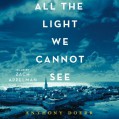
This is a touching story about the life that came after Auschwitz; the way recovery happens, even when we won't forget or let go, even when we hold on to our pain with both hands. Recovery happens, but it's different. It brought a whole new understanding of Auschwitz and what it meant to have been there. Most of what I've seen about Auschwitz and the concentration camps focus on those perpetrating the horrors and shows the prisoners as others. Here, the Nazi's are the other and the US is not even involved. It's not about liberation or war, it's about marriage and dealing with what comes later.
The effect that the experience at Auschwitz has on the characters in this book and those who meet them after is an entirely different narrative than we're used to in the US. Sort of. It's a narrative of PTSD, which we generally reserve for veterans. The difference makes this book about the way people keep their pain close to them, how they learn to depend on it. It's the way they commiserate amongst themselves and remember together and the way that is its own sort of healing. It's in the way they know things about themselves and each other that you only learn in those kinds of circumstances and surprises that happen when everyone attempts to return to "normal life".
Lena is our window into Heiner's world. She's the every woman who had nothing to do with Auschwitz and doesn't understand how such horrible things could happen. She doesn't appreciate the strange humor of the survivors but she loves them anyway. She also serves as the reason Heiner and his friends get to tell stories and reminisce about when they met. Her reaction is our reaction.
But the book isn't just about Heiner or Lena or some survivors of Auschwitz alone. Their lives are littered with more people than that, some of which were around before the war and others who they only knew after. Even those who don't seem that closely related at first lend depth and history to the story.
The character progression of both Heiner and Lena is remarkable. Each finds their way of dealing with everything. Their growth and the way they eventually ease into each other felt natural, like it would just happen that way. There was a force of will to help it along, but it wasn't made out to be so hard that it was not believable. Marriage sometimes takes a force of will, especially if it lasts as long as theirs. But the growth isn't just about their marriage, there's the way they deal with others as life goes on and Lena getting to know his friends. The tone of the book is beautifully nostalgic, even when they speak of horrible days. The nostalgia is because of each other, it's for each other.
I have to admit that I highlighted this book like I was going to be tested on it. There were so many lines that blew my mind, that changed the way I thought about everything involved with Auschwitz and it's few survivors. For me, it changed everything I thought I knew about Auschwitz. Since I read it on Scribd, the highlights aren't readily available but here are two quotes that were among my favorites:
They wrote down what they remembered, they spoke into microphones, yet what they'd experienced was not the same as what could be read or heard later. Their memories ought to be made into vaccines, to prevent the illnesses that had caused them.
and
They were silent, abandoned the subject, and then the fight would start all over again. She'd said just. It was that word that troubled him. Just because he was at Auschwitz. After endless debates, Lena lost her patience. Heiner, my dear, she said sharply, let me enlighten you on the word that's bothering you so much. Just is a small, embittered word with a difficult life. It has to push its way into sentences, even those where it isn't absolutely necessary, and imbue them with new meaning. First: The just in my sentence is meant in the sense of "although," and does not diminish your friend's suffering. What I wanted to say was: Although he was at Auschwitz back then, I don't have to accept it when he talks nonsense today.
And then she goes on to explain all the other ways that "just" is used because the book is every bit as much about marriage as being a survivor.

 Log in with Facebook
Log in with Facebook 






